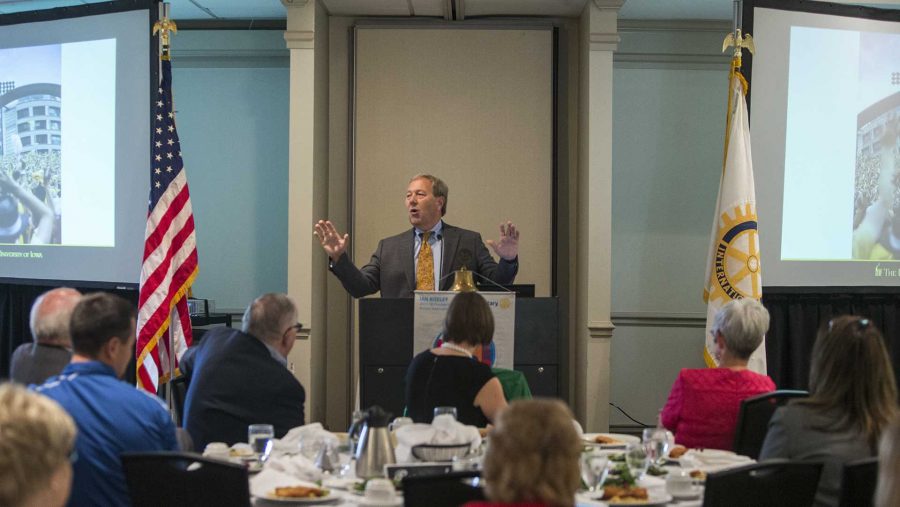Sometimes, University of Iowa President Bruce Harreld said, leadership means relentlessly relaying his vision of what needs to happen to set the institution on a path toward progress.
“… We as leaders tire of our messages long before people understand what we’re talking about,” he told the Iowa City Noon Rotary Club Thursday afternoon while delivering the annual State of the University Address. “It’s OK to be relentless and boring.”
One of those messages Harreld continues to drive home in his public-speaking engagements is the need for funding to implement the UI’s strategic plan.
“It’s important that we have the right resources to sustain the kind of work we are doing at an institution like the University of Iowa,” UI Foundation President Lynette Marshall said.
Harreld said the UI can accomplish that work through a combination of state appropriations, tuition revenue, internal efficiencies, and external support.
The state Legislature reduced appropriations to the three public institutions governed by the state Board of Regents — the UI, Iowa State University, and the University of Northern Iowa — earlier this year. The reduction means regent universities will see a $30.33 million loss for fiscal 2018 to the general budgets compared with fiscal 2017, according to regents’ documents.
RELATED: Regents to request $12 million to fund financial aid for Iowa resident undergrads
However, the regents approved a request for an additional $12 million in base funding for the three universities, all of which is would be dedicated to resident undergraduate financial aid. Student leaders have said aid needs to increase — and Harreld said again on Thursday it will — as tuition continues to climb.
In August, Harreld proposed the UI’s five-year tuition plan to the regents. Assuming state funding will remain an unreliable revenue source, the proposed increase would be 7.08 percent for resident undergraduate tuition through fiscal 2022. For nonresident undergraduate tuition, the proposed annual increase is 2.08 percent each year.
The regents will give tuition rates a first reading later this month when they meet in Cedar Falls before taking a final vote in December. They have said the December vote will be final, and they intend to make summer votes to raise tuition a thing of the past to ensure predictability for students and families as they plan their finances.
As a product of public higher-education himself, Harreld said, he is concerned about too much of the cost being dependent on tuition increases and the effect that would have on accessibility. The UI will also need to make choices about the types of institutions it competes with and compares itself against.
“It’s not automatic that we’re going to get any of this money, the way politics are playing out in the state,” he said. “If we don’t get the money, we’re going to have to back off of some of these ambitions or actually say maybe we should be smaller.”
RELATED: UI takes measures to limit enrollment in Class of 2021
Despite the challenges, Harreld said, he has tremendous hope for the UI.



